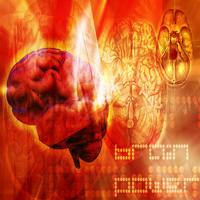Intuitive Decision Making

Regular readers will remember some of our discussions about the value and development of intuition and the differences between intuition and instinct.
Almost a year ago I reported on some exceptionally important research into decision making that showed that when making complex decisions rapid intuitive unconscious decisions usually trump conscious deliberation.
There is some brand new research reported in today’s issue of the journal Current Biology.
Li Zhaoping and Nathalie Guyader form the Department of Psychology at University College, London used a computer-based task to examine decision making. Ten volunteers were showed a computer screen covered in over 650 identical symbols, including one rotated version of the symbol. They were asked to decide which side of the screen the rotated image was on.
Given a fraction of a second to look at the screen, the subjects were 95% accurate. But when they were allowed to scrutinize the image for over one second, they were only 70% accurate.
It is likely that the instinctive decisions were more often correct because the preconscious processing regions of the brain recognized a rotated version of the same object as different from the original, whereas the conscious brain could identify the two objects as identical, albeit in different orientations. A great many processes occur below the level of conscious awareness, and they are best called pre-conscious, rather than terms like unconscious, which can lead to confusion with the psychoanalytic term “the unconscious mind” or “subconscious,” which includes many of the autonomic and endocrine functions of the body.
What normally happens is that the conscious or top-level function of the brain, when active, vetoes our initial subconscious decision – even when it is correct – leaving us unaware or distrustful of our instincts and at an immediate disadvantage.When we trust our inbuilt, involuntary preconscious processes for certain tasks they are actually more effective than using our higher-level cognitive functions.
This makes good sense: people and animals are designed to notice anything that is out of the ordinary to help them escape from predators. There is often no time for consious thought. This is also why martial artists practice and practice again so that they can react without thinking.
As a youngster I was a keen fencer. For hours I would use the tip of my foil to keep hitting a squash ball that dangled by a rope from the ceiling. After a while it becomes a reflex, because the pre-conscious regions of the brain take over.
This research once again highlights something very important: use instinctive and intuitive reactions when requied, but balance them with sound reasoning: one without the other is rarely a good idea!







Here’s an example where “snap” decision making may not be useful: most people read about a study such as the one you describe here and leap to the conclusion that they should simply trust their “gut feelings.”
But this study describes a very specific type of pre-conscious processing related to visual information.
And, as you correctly contend, this is an evolutionarily valuably ability.
However, the question of how this relates to decisions about, say, future happiness, or creating optimal outcomes is still up in the air.
And, from my reading, the studies that attempt to address those questions are rarely as will crafted as would be necessary to come to a meaningful conclusion.
But, hey, writing this whole mini-missive was simply what my gut told me to do 😉
Dear Steven,
Thank you so much for your comment.
Happily I agree with everything that you say, and let em reiterated what I said in my last paragraph: to balance instinctive and intuitive reactions with sound reasoning.
Kind regards,
RP